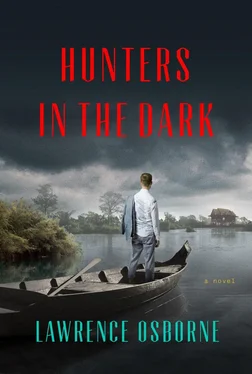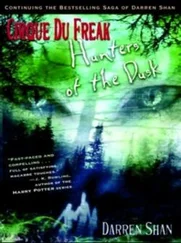“It’s all right. It’s cheaper than East Grinstead.”
“Maybe you should come around for dinner at our house and meet everyone. Would you do that?”
“Certainly.”
“Not tonight, Sophal is out doing music. What about tomorrow then?”
“All right.”
Robert’s voice wavered and he sensed some tensions coming to him from afar, like something clammy and malevolent carried over a body of still water.
“I’ll have my wife ask the cook to make something Khmer. Do you like Khmer food?”
“Of course.”
“Some barangs won’t eat it. They survive on steaks and milkshakes.”
Robert shook his head. “I find that hard to believe. It’s so delicious.”
“I’m glad you think so. You seem like you’ve been here a long time.”
“A few weeks. But it feels like a few days.”
“A few weeks already. You don’t sound too sure.”
“Maybe I’ve lost track of time.”
Robert smiled but the doctor did not return the gesture.
He said, instead, “That’s what happens when you come here when you’re young and you’re not Khmer. It makes the time fly by. Everyone says so and I believe it.”
—
From the shadowed corners of the room the boys in the bow ties watched them with a wary aloofness that found its only expression in the permanently upturned corners of their mouths. There was a fixity about them, a muted beauty which made them, strangely, unapproachable. They stood there watching the Englishman in his odd clothes listening to the old Khmer doctor, whom they knew for his kindness and dottiness, and they reminded Robert of the children he taught in Elmer and who sometimes walked home with him across the railway bridge to his cottage at the edge of the woods. Their eyes moved as slowly as marbles rolling on a gradient which the eye could not detect and they spoke reluctantly only when they were spoken to, but there was thought and a subtle malice in their stoniness and gravity. It was a form of respect that does not shrink from quietly judging. The children were always curious about him and he was sure that they felt sorry for him: he was a forlorn figure to them. They could smell his loneliness and mediocrity, and in a perverse way it drew them to him. The doctor, for his part, could sense the same thing but it didn’t draw him to Robert. It made him aware that there was an opportunity here.
“Maybe you’ll stay a while, now that you are here,” he said affably. Their plates were covered with mustard-seeded blood. “Do you not have a girlfriend back home — or something like that?”
“Not really, no.”
“That’s a shame. Maybe you are living in the wrong place. It’s always wise to live in the right place.”
“I guess it is at that.”
“What does your father say?”
“My father?”
“What does he say about you not having a girlfriend?”
“He doesn’t say anything about it.”
“Does he not, indeed? Does he not?”
“Not at all.”
“That is rather strange. Maybe he is under the impression—”
“I’m an obscenity?”
The doctor roared with laughter and raised his fork.
Obscenity? Robert thought wildly. What did his father think he was? The doctor’s insinuation was strange, but it was a provocation to sound him out about his sexuality. It was better to ignore it.
“Well, never mind, Robert. You are in our land now. You don’t have to pretend to be anything you are not.”
“Pretend?”
“You know what I mean. You can let your hair down here.”
Again, the index finger was raised.
“Garçon, let’s have some crème brûlées, by Buddha. Why not? Does anyone have anything against it? We’ll grow fat for a day then deflate to normal size.”
The doctor now receded an inch or two from the edge of the table and took off his glasses and then wiped them with his starched napkin. He apologized for using the phrase “by Buddha,” which was entirely inappropriate and heretical, but he had taken to using it in the old days and he had stuck with it because he found it amusing. He discouraged his guest from doing the same.
“Tomorrow night, when you come — here’s my card with the address — I’ll give you crème brûlées again, it’s our favorite dessert at home. I hope you won’t be bored. We are rather quiet people who enjoy our evenings in our garden. We rarely go out or throw dinner parties.”
They drank green tea with the crème brûlées and Robert asked if Sophal would know why he was there when he came.
“We’ll talk to her this afternoon. She’s not terribly enthusiastic about English lessons, I’ll admit, but she’ll go along with it because it pleases her mother and she doesn’t have to do it fanatically. We are thinking something like an hour every day or so. Would you be able to do that?”
“An hour every day?”
“Well, I know it’s a bit bold of me to suggest every day, but we’d be very grateful. It’s honestly what she needs to do in order to improve.”
“I suppose I could.”
“You sound a bit doubtful. I understand. I’ll be willing to make it worth your while. If you could do two hours, even more so.”
“Two hours?”
“Of course, I don’t know how much time you have—”
“I have time,” Robert said. He held himself back from adding, “A lot of time.” How easy it was! They finished up their meal and walked through the Royal corridors to the Elephant Bar, on the far side of the lobby, which was more crowded than the restaurant. There was a pool table there, the arches were painted with images of elephants and there was a case of fine cigars with a hygrometer and little boxed posters of Jalisco and Gaulois.
They went to the bar and ordered cosmopolitan flights and the doctor paid again. One of the three shots that made up the cosmopolitan was with black pepper; another with orange. The glasses were expertly iced and the little silver elephants around them seemed to be keeping an eye on Robert’s hands. He noticed how short and curiously shaped the doctor was. Like a bowling pin. From where did his inexhaustible good humor come? But it was a humor that was like light playing on the surface of oily water. Peer into it and all you saw was rainbow oil and reflections that moved constantly.
The doctor sipped his overcolored drink and his lips were sugared.
“It was pure luck, Robert, that you answered my ad. But do you really believe in luck?”
“I can’t decide.”
“It seems like an impossible idea, doesn’t it?”
“I’ve never experienced enormous good luck, to be honest. Just once or twice.”
“We all get lucky one time in our lives. And usually four or five times. I’ve had a stroke or two in the past. I should have been dead by now.”
Some pretty barang girls looked over at Robert with a detached curiosity. Here the whites always looked each other over at a distance, suddenly aware of something deep within them that never needed to come into expression.
“I am probably more superstitious than you,” Sar said. “It’s said that we are a superstitious people. But I think superstition is a biological trait in human beings.”
“Like being honest, then.”
“Yes, and like murder. Murder seems to be really universal, doesn’t it?”
Robert laughed, though keeping his voice down.
“You could say that, yeah.”
“I do say it. Surely your literature studies have proved that to you.”
“I see your point. But I try not to think about murder if I can help it.”
“Neither do I. I do think about superstition, however. I’m not convinced, in short, that all superstition is superstitious.”
“I’m only superstitious about ladders,” Robert said. “I’ll never walk under one.”
Читать дальше












